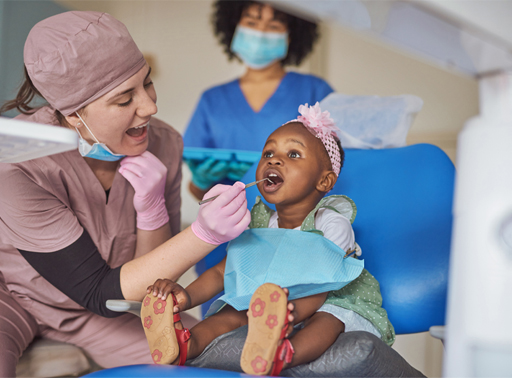3.2 What can be done to improve children’s oral health?
There is a pressing need to address the causes of poor oral health and to work with children and families to develop sustainable, realistic and affordable ways of preventing poor oral health. Increasing adults’ knowledge about healthy eating and drinking and addressing ways to introduce healthy options that contribute to good oral health and hygiene can make a positive contribution. Some families, especially families who may move from home to home regularly, may be described as ‘hard to reach’. However services such as dentists can be hard to reach for some families.
The statutory curriculum for children aged 0–5 years in England requires nurseries to take responsibility for children’s oral health, it states in the Early Years Foundation Stage( that ‘providers must promote the good health, including the oral health, of children attending the setting’ (Department for Education, 2024, p. 31). Therefore, to comply with this statutory requirement and to contribute to children’s good oral health, it is important that they know why and how to do this, and how to work with parents to ensure children have good levels of oral health to avoid short- and long-term damage to physical and mental health.
The following case study explains how Juweirya, a practitioner working in an early years setting, has approached this requirement.
Case study: oral health in early years settings
As children are still coping with the new transition to different rooms, we felt it was very important we create a warm loving environment where children are being taught how to regulate their emotions, understand behavioural expectations and create strong bonds between the practitioners and children before we engage in such an important topic. As we feel this is the basis to then be able to introduce important topics such as oral health.
The introduction of oral health in preschool has begun by bringing awareness to oral health language and vocabulary such as germs, healthy gums, unhealthy gums. We implement strategies such as reading stories and singing songs which will help children gain more knowledge and help to create opportunities to discuss oral health. We hope this will encourage them to take care of their mouths. We will then start to incorporate activities such as brushing teeth, brushing away germs and building a mouth using papier-mache so children become familiar with the different components of the mouth. Also changing our role play into a dentist. This will support children's understanding of oral health.
Yet again, the importance of positive relationships is highlighted by Juweirya as being the foundation to promoting children’s health. Juweiriya has described what she does in the nursery setting to help develop children’s understanding of oral health, as well as addressing the statutory requirement within the EYFS to improving children’s oral health. She describes the playful approaches they have develop. In addition to Juweirya’s suggestions, in Session 7 Karen talked about how she invited a dental nurse into the setting to talk with the children.
Although there are many ways of working with parents and other professionals to improve oral health and prevent dental decay, there is a need for the wider influences on oral health to be addressed across society, such as poor diet.

